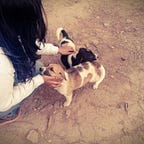Abstraction in Interpersonal Relationship
A self-imposed dilemma
Abstraction (noun) — the quality of existing as or representing an idea, a feeling, etc. and not a material object, or something that has this quality; the quality of being very general and not based on real examples, or something that has this quality (1)
The concept of abstraction appeared in my line of sight quite recently. Abstraction originates from the Latin abs, meaning away from, and trahere , meaning to draw. In terms of programming language, it is the process of stripping away or removing characteristics from something in order to reduce it to a set of essential characteristics. This concept is biomimicri-ed from our behavioral traits and cognitive patterns. But are we able to judiciously wield the power of abstraction when it comes to dealing with emotional human beings?
Most of the times, particularly in emotionally charged situations, we don't interact clearly with those around us, rather we churn the ideas and concepts that we relate to them in our head and often end up rushing to reply, instead of having a conversation. This is the classic reply vs response behavioral dichotomy. We’ve trained ourselves to outpace our natural speed of cognitive thinking by overthinking, and more often than not, we’re reducing the person in front of us to a living-breathing humanesque form of notions that are database-d by the crafty brain.
Abstraction (noun) — the action of removing or separating something from a place or context (= the situation, facts, words, etc. that exist around something) (2)
This habit is triggered and fueled continuously by the cause and effect cycle of stress and the resulting frustrated state of mind. We could blame technology, or truthfully acknowledge that it’s actually our inability to self-regulate and our addiction to technological farces that is one significant driver of our self-imposed cognitive limitation and impaired judgement. The concrete and substantial scarring of the natural world around us is also considered as herald of a soon to be real dystopian world — and this is another sentient problem that imperceptibly threatens our concept of wellbeing, adding to our sensory overload. We could think of many such catalysts of our generally perceived misery. Perceived because everything is perspective. But, in general, as individuals averaging our life experience, and as cumulative mass sentiment shared among larger groups, we experience dilated time continuum of agitation and unrest that are only periodically interrupted by ‘the good life’, and occasionally, by bliss. This ability to examine a zoomed out view is also an abstraction function.
Consider the impact abstracting exerts on our self-knowledge and awareness of interpersonal dynamics —
The abstraction by our imagination means we earn the approbation (or disapprobation) from those unlike as well as those like us. (3)
We perceive several things preventing us from behaving humanly and humanely. We often forget to be human, to be kind. The immediate surge of affectionate hormones that animal lovers feel when approached by an animal is attributed to the instant trust that we humans inherently place on lesser animals. It is far more complicated to interact even at a surface level with another human being — hence the facade and the plays, and the playwright unknown behind the stage.
Is it wiser to be observant and consciously present in the conversation than abstracting about the person in front of us? Will it help us behave kindly, gracefully, intelligently? Are we overworking our wondrous ability to perform instantaneous and often critical analysis of a situation — abstraction — which once was instilled in us as an inherently defensive evolutionary mechanism so that we can consume a vast amount of denotative and connotative information to distil an educated essence for quick decisioning and efficient functioning — to an extent that it now acts as an impediment to our emotional and critical judgement sense? The immediate and long-term relationship impairment aside, we might end up appearing rude and lacking taste. We’ll surely miss opportunities of connecting authentically with another human being, give up chance to peer at another universe. Oftentimes, these would be our dear and near ones. Is it worth it?
Shall we try to do and be better?
I would rather live my life as if there is a God, and die to find out there isn’t, than live my life as if there isn’t, and die to find out there is.
— French philosopher Albert Camus
1–3: Sourced from Cambridge dictionary
